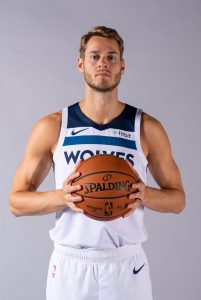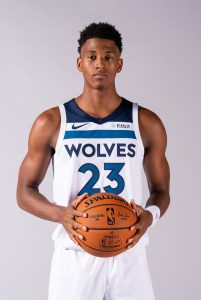Hoops Rumors is breaking down the 2019 offseason for all 30 NBA teams, revisiting the summer’s free agent signings, trades, draft picks, departures, and more. We’ll evaluate each team’s moves from the last several months and look ahead to what the 2019/20 season holds for all 30 franchises. Today, we’re focusing on the Minnesota Timberwolves.
Signings:
-

Standard contracts:
- Jake Layman: Three years, $11.28MM. Acquired via sign-and-trade using trade exception.
- Noah Vonleh: One year, $2MM. Signed using mid-level exception.
- Naz Reid: Four years, minimum salary. Second and third years non-guaranteed. Fourth-year team option. Initially signed two-way contract, then converted to standard contract using mid-level exception.
- Jordan Bell: One year, minimum salary.
- Two-way contracts:
- Non-guaranteed camp contracts:
- Jordan Murphy: One year, minimum salary (Exhibit 10).
- Lindell Wigginton: One year, minimum salary (Exhibit 10).
Trades:
- Acquired the draft rights to Jarrett Culver (No. 6 pick) from the Suns in exchange for Dario Saric and the draft rights to Cameron Johnson (No. 11 pick).
- Acquired Jake Layman (sign-and-trade) from the Trail Blazers in exchange for the draft rights to Bojan Dubljevic.
- Acquired Treveon Graham, Shabazz Napier, and cash ($3.6MM) from the Warriors in exchange for the draft rights to Lior Eliyahu.
Draft picks:
- 1-6: Jarrett Culver — Signed to rookie contract.
- 2-43: Jaylen Nowell — Signed to four-year, $6.63MM contract. Second and third years non-guaranteed. Fourth-year team option. Signed using mid-level exception.
Waiver claims:
- Tyrone Wallace (from Clippers). One year, minimum salary ($1,588,231). Non-guaranteed. Claimed using minimum salary exception.
Departing players:
- Jerryd Bayless
- Mitch Creek
- Luol Deng
- Taj Gibson
- Tyus Jones
- Cameron Reynolds (waived)
- Derrick Rose
- Dario Saric
- Jared Terrell (two-way)
- Anthony Tolliver
- C.J. Williams (two-way)
Other offseason news:
- Hired Gersson Rosas as president of basketball operations.
- Named Ryan Saunders permanent head coach.
- Hired Sachin Gupta as executive VP of basketball operations.
- Hired Gianluca Pascucci as assistant GM; hired Joe Branch as assistant GM; promoted Emmanuel Rohan to assistant GM.
- Hired David Vanterpool as lead assistant coach.
- Hired Pablo Prigioni as assistant coach; hired Bryan Gates as assistant coach.
Salary cap situation:
- Remained over the cap.
- Carrying approximately $124.76MM in guaranteed salary.
- Hard-capped.
- $4.96MM of mid-level exception still available (used $4.3MM on Noah Vonleh, Jaylen Nowell, and Naz Reid).
- Full bi-annual exception ($3.62MM) still available.
- $822K traded player exception available (expires 11/12/19).
Story of the summer:
When Gersson Rosas was hired as the Timberwolves’ new president of basketball operations this spring, there was speculation that it could be a more eventful offseason than expected in Minnesota. After all, Rosas was a longtime lieutenant of Rockets GM Daryl Morey, and Morey has never hesitated to swing for the fences on the trade market. By all accounts, Rosas was prepared to bring that same aggressiveness to his new position.
Fans and observers expecting fireworks were in for a letdown, however, as the Wolves didn’t end up having a wild summer after all. The team’s biggest free agent investment was a three-year deal worth less than $4MM annually for relatively unknown forward Jake Layman. On top of that, high-priced trade candidates like Andrew Wiggins, Jeff Teague, and Gorgui Dieng all stayed put.
Still, the absence of blockbuster moves wasn’t for lack of trying. The Wolves met with D’Angelo Russell at the start of free agency and reportedly believed they had a real chance to land him in a sign-and-trade deal before he pivoted and decided to head to Golden State instead.
Plus, the Wolves’ draft-night deal for Jarrett Culver showed the kind of gamble Rosas is willing to take in the right situation. The team gave up Dario Saric – who was entering a contract year – for the right to move up from No. 11 to No. 6 for Culver, a potential two-way standout on the wing.
While Rosas and Minnesota’s new management group may not have made a huge splash immediately, there will be more opportunities to do so, especially when pricey contracts for Teague and Dieng expire in 2020 and 2021, respectively.
For now, the Wolves will rely on further improvement from young players like Karl-Anthony Towns, Josh Okogie, and Wiggins, along with steady contributions from veterans like Robert Covington and Teague as they look to fight their way back to the playoffs. But if Rosas delivers on his reputation, this roster could look much different within a year or two.
Key offseason losses:
As if often the case for teams with new heads of basketball operations, the Timberwolves didn’t make much of an effort to re-sign their free agents this summer. Veterans like Derrick Rose, Taj Gibson, and Luol Deng were Tom Thibodeau favorites who didn’t fit into the team’s retooling process. While Deng didn’t play much, Gibson was a regular starter and a veteran leader, and Rose enjoyed an impressive bounce-back season in 2018/19.
In addition to Gibson, the Wolves parted ways with two more power forwards, letting Anthony Tolliver walk in free agency and trading Saric to Phoenix. Saric was one of the players acquired by Minnesota in last year’s Jimmy Butler blockbuster, but Rosas apparently didn’t view him as part of the organization’s long-term plans.
Among the other players not in the Wolves’ future plans? Tyus Jones, who had been the team’s primary backup at point guard over the last four years. With Thibodeau and Rose gone and Teague seemingly on the trade block, it looked like Jones might get a chance to take on an increased role, but Minnesota opted not to match the three-year, $26MM+ offer sheet he signed with Memphis.
It was an interesting decision, since the club remains somewhat thin at the point and Jones could theoretically have been a decent trade asset at that price. But Rosas’ group opted to maximize the Wolves’ cap flexibility going forward by not locking themselves into that three-year deal.
Key offseason additions:
The Timberwolves’ decision to move up five spots to draft Culver reflects how much they like the former Texas Tech standout. While there were rumors that Minnesota was looking to trade up to secure a point guard like Darius Garland and Coby White, Culver is more of a shooting guard or small forward, though he’s capable of guarding a number of positions on the perimeter.
After making just 30.4% of his three-point attempts in his final college season, Culver will have to improve his outside shot to develop into a reliable three-and-D wing, but he’s capable of generating shots for himself and others.
Minnesota’s other offseason additions were primarily role players. In the frontcourt, Layman, Noah Vonleh, and Jordan Bell signed as free agents and should all get the opportunity to earn regular roles. Layman and Bell opened the summer as restricted free agents, but the Warriors pulled Bell’s qualifying offer and the Trail Blazers were willing to sign-and-trade Layman for essentially nothing, clearing the way for Minnesota to add both players without a fight.
At point guard, the Wolves added Shabazz Napier and Tyrone Wallace via trade and waiver claim, respectively. Given the roster crunch in Minnesota, Wallace and his non-guaranteed contract may not end up on the regular season roster, which would put Napier in position to be Teague’s primary backup at the point.
Outlook for 2019/20:
After putting a merciful end to their playoff drought in the spring of 2018, the Timberwolves’ 2018/19 season was doomed from the start by Butler’s trade demand and the lengths he went to make sure the franchise met that demand.
Without Butler on the roster, Minnesota’s ceiling is limited, but there’s still some intriguing talent on this roster. Towns is one of the NBA’s best big men, a healthy Covington would give the Wolves a two-way threat they desperately missed last season, and Wiggins’ upside remains tantalizing if he can ever put it all together.
It may not be enough to make a serious run at a playoff spot, but with Rosas and Ryan Saunders running the show in Minnesota, the attitude in the locker room at least seems to be more positive than it was a year ago. Bigger changes are ahead for the Wolves as Rosas begins to put his stamp on the organization.
Salary information from Basketball Insiders was used in the creation of this post. Photos courtesy of USA Today Sports Images.
Gonna be a long season in MN. But let the young kids play , see what they have. and then Teague goes off the books and we should be able top overpay a free agent , plus have yet another lottery pick to add to the roster in 2020
Not a lot of free agents next summer except for Anthony Davis.
So a guy named Rosas takes over, and promptly there is the Running (off) of the (ex) Bulls in Minni-Pamplona.
That new line up from top to bottom has got to strike fear in the hearts of…no one but season ticket holders. Until Taylor sells and they get a coach that’s more than just a shot in the dark they will once again tread the waters of hardly mediocre.
I like the team they addressed there two holes at SG and PF. At SG they needed to improve by getting someone who can defend well and be a good all round player maybe a elite scorer. They managed to get Culver at 6 in the draft and hes a good defender and all round player.
At PF they needed to replace Gibson and Saric with someone who is really physical and athletic for a cheap price but still get decent production. They managed to pick up Jordan Bell and Noah Vonleh, two players who are physical beast, both are young and willing to work hard.
The team looks young and promising but there are still a few issues like what to do with Wiggins and Deing. Plus waiting out Teagues contract. But with Culver KAT and Covington all on long term deals they have a good trio to work off which is better than just a duo which they had last year
I watched Vonleh on the Knicks last year. I liked him a lot and I think he’s an absolute steal at $million but I wouldn’t call him a physical beast. Just a well rounded power forward who does a bit if everything. He was originally a draft bust but is now a borderline rotation player.